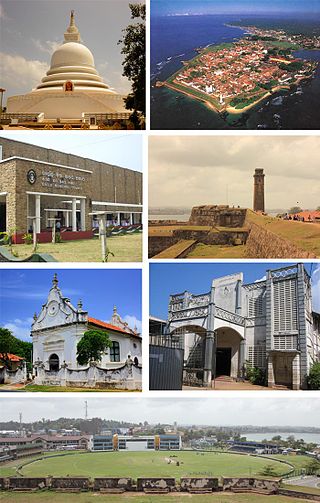
Galle is a major city in Sri Lanka, situated on the southwestern tip, 119 kilometres (74 mi) from Colombo. Galle is the provincial capital and largest city of Southern Province, Sri Lanka and is the capital of Galle District.

Nugegoda is a large, densely populated suburb of Colombo, Sri Lanka. It is located in the border of Sri Jayawardenapura Municipal Council limits and Dehiwela Mt. Lavinia Municipal Council limits, just outside Colombo city limits.

The Sri Lanka Institute of Information Technology is a non-profit private university in Sri Lanka specialising in technology and management. It has two campuses and four regional centres, the main campus being based in Malabe and a Metropolitan Campus in Colombo. SLIIT is a member of the Association of Commonwealth Universities and International Association of Universities, and has several partnerships with international universities.

The Jaffna Kingdom, also known as Kingdom of Aryachakravarti, was a historical kingdom of what today is northern Sri Lanka. It came into existence around the town of Jaffna on the Jaffna peninsula and was traditionally thought to have been established after the invasion of Kalinga Magha from Kalinga in India.

The Sangam period or age, particularly referring to the third Sangam period, is the period of the history of ancient Tamil Nadu, Kerala and parts of Sri Lanka spanning from c. 6th century BCE to c. 3rd century CE. It was named after the famous Sangam academies of poets and scholars centered in the city of Madurai.

Education in Sri Lanka has a long history that dates back two millennia. While the Constitution of Sri Lanka does not provide free education as a fundamental right, the constitution mentions that 'the complete eradication of illiteracy and the assurance to all persons of the right to universal and equal access to education at all levels" in its section on directive principles of state policy at (27. Sri Lanka's population had an adult literacy rate of 96.3% in 2015, which is above average by world and regional standards. Computer literacy in 2017 28.3% and phone users in 2017 105%, website users 32% in 2017. Education plays a major part in the life and culture of the country, which dates back to 543 BC. Sri Lanka's modern educational system modeled after Christian missionary system was brought about by its integration into the British Empire in the 19th century. Education currently falls under the control of both the Central Government and the Provincial Councils, with some responsibilities lying with the Central Government and the Provincial Council having autonomy for others. Education institutions with a tradition dating back to 5 BC are largely ignored by the state.
Vaddukoddai is small but important town in the minority Sri Lankan Tamil dominated Jaffna peninsula of Sri Lanka. It became prominent with the founding of Asia’s first modern university level collegiate known as Batticotta Seminary by the American Missionaries from New England in 1823.
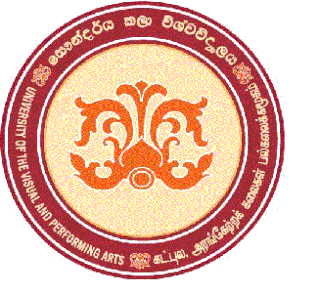
University of the Visual and Performing Arts (UVPA) is a public university located primarily in Colombo, Sri Lanka, specialising in art, design, fashion and the performing arts. It was formerly known as the Government College of Fine Arts, Heywood Institute of Art and the Institute of Aesthetic Studies of the University of Ceylon. It has no known date of foundation, but there is evidence of teaching as far back as 1893. It is the only university in Sri Lanka to exclusively offer special degree programs in visual and performing arts.

Swami Vipulananda, also known as Vipulananda Adigal, was a Sri Lankan Tamil Hindu social reformer, literary critic, author, poet, teacher and ascetic from the Eastern Province of Sri Lanka. Vipulanada was an early pioneer associated with the Indian-based Ramakrishna Mission in Sri Lanka. Along with other reformers, Vipulanada was instrumental in the revival of the Hindu religion and native traditions in Sri Lanka after a long period of dormancy and decline during the previous 500 years of colonial rule by various European powers.
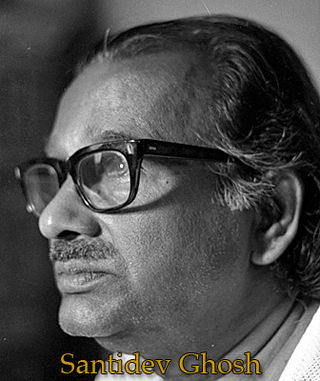
Santidev Ghose was an Indian author, singer, actor, dancer and maestro of Rabindra Sangeet.
Sri Adwayananda Public School, administered by Alliance Educational Foundation, is a private, English-medium school in Malakkara, Kerala, India, that conducts classes from kindergarten to twelfth standard.
Social class in Sri Lanka is often described as casteless, though caste is still found on the island in both a symbolic and a practical sense. Caste is also used in an analogous sense to refer to the new social class divisions that have appeared in recent decades. The combination of ethnic nationalist movements that saw caste as an island-wide dividing tool, strong emphasis on providing access to education and healthcare regardless of background, and historic lack of discrimination among the colonial civil service played a factor in eradicating the caste system in most sectors of the island's society. Although the Buddhist culture actively fought against all forms of class discrimination, many Buddhist organizations used caste as a method to extract surplus from temple property.

Nissanka Malla, also known as Keerti Nissanka and Kalinga Lokesvara was a king of Polonnaruwa who ruled the country from 1187 to 1196. He is known for his architectural constructions such as the Nissanka Lata Mandapaya, Hatadage and Rankot Vihara, as well as for the refurbishment of old temples and irrigation tanks.

The South Asian Institute of Technology and Medicine (SAITM) is a privately owned educational institution providing higher education in Sri Lanka. It is recognized as a degree awarding institute under section 25A of the Universities Act No. 16 of 1978. In 2018, the parliament of Sri Lanka passed a special provisions act to abolish SAITM Medical faculty and to transfer the students to General Sir John Kotelawala Defence University.

Jaffna is the capital city of the Northern Province of Sri Lanka. It is the administrative headquarters of the Jaffna District located on a peninsula of the same name. With a population of 88,138 in 2012, Jaffna is Sri Lanka's 12th most populous city. Jaffna is approximately six miles from Kandarodai which served as an emporium in the Jaffna peninsula from classical antiquity. Jaffna's suburb Nallur served as the capital of the four-century-long medieval Jaffna Kingdom.

Angela W. Little is Professor Emerita at the Institute of Education, University of London. She is known for her work in primary education policy and practice in developing countries as well as education planning, program evaluation and assessment. In particular she has focussed in seven main areas:
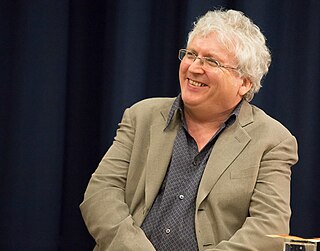
Lama Jampa Thaye is a teacher of the Sakya and Karma Kagyu traditions of Tibetan Buddhism. He has been teaching for over 30 years and is the spiritual director of the Dechen organisation of Buddhist Centres. He is the author of several books on Tibetan Buddhism and has a PhD in Tibetan Religions from the University of Manchester. He is renowned for being one of the first Westerners who are authorised to transmit Vajrayana teachings.
Lincoln University College, Petaling Jaya, Malaysia, was founded in the year in 2002 as Lincoln College and in 2011 Lincoln College was upgraded to Lincoln University College. Lincoln University College is a private institution that provides higher education, approved by the Malaysian Qualifications Agency and the Ministry of Higher Education. The University College has got 5 Star ranking by Ministry of Higher Education, Malaysia in 2017 and 2019. Lincoln University College among the nine Malaysian universities listed in the Times Higher Education (THE) University Impact Rankings 2019 ranked 80th in Quality Education provider in 2020 TIMES ranking. Lincoln University College got ISO 9001:2015 Certification in 2019. Situated in the cosmopolitan town of Petaling Jaya, the university college is close to the capital city, Kuala Lumpur.
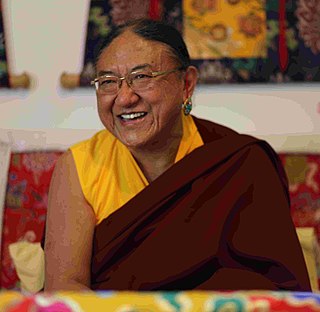
Sakya Trizin Ngawang Kunga served as the 41st Sakya Trizin, the throne holder of the Sakya Lineage of Tibetan Buddhism, from his appointment in 1952 until his retirement in 2017. His religious name is Ngawang Kunga Tegchen Palbar Trinley Samphel Wangyi Gyalpo. After passing the throne of the Sakya lineage to his elder son Ratna Vajra Rinpoche who became the 42nd Sakya Trizin on 9 March 2017, he is now known as Kyabgon Gongma Trichen Rinpoche. He is considered second only to the Dalai Lama, in the spiritual hierarchy of Tibetan Buddhism.
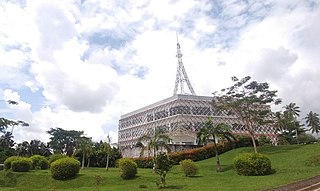
The Sri Lanka Institute of Nanotechnology is a Sri Lankan research institute specialising in the field of nanotechnology. It was incorporated in 2008 as a public-private partnership between the Government of Sri Lanka and five private companies, and is notable for being the first public-private research institute in the country.















